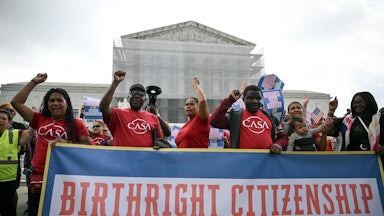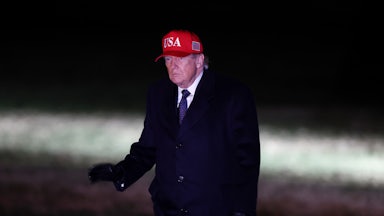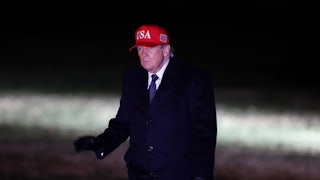Donald Trump has made a career of bringing meritless cases to try to intimidate opponents, influence the public narrative, or delay other proceedings. He has been willing to absorb the harsh criticism and risk of adverse judgments, reasoning that he could weather any storm so long as his base remains steady.
Trump’s base has stood by him through almost anything: indictments, impeachments, grotesque abuses of power. The same voters who cheered family separation and shrugged off his call to terminate the Constitution have stayed firmly in his corner.
In recent settlements with CBS and ABC, he leveraged threats directed at the companies’ broader business holdings to secure settlements of weak or groundless cases. But the Jeffrey Epstein story is different. It touches something even Trump’s most devoted followers may care about more than him: the conspiratorial obsession with pedophilia rings and global elites.
And he is taking on a publication—The Wall Street Journal—that has bet its reputation on the story. He’s not going to be able to shake down the Journal for a cheap settlement and a claim of victory.
For years, MAGA diehards—and adjacent QAnon circles—have insisted that a secret cabal of elites is engaged in child trafficking and that Epstein was central to the network. The belief isn’t just that Epstein was evil, but that he was a gatekeeper to a world of depravity involving media moguls, financiers, and powerful politicians.
While he was out of power, Trump encouraged MAGA’s obsession and promised to open the books if he returned to the White House. And in recent weeks, Attorney General Pam Bondi all but swore that the full story was coming, only to deliver a meek “never mind” and retreat to the position that there were in fact no Epstein files to reveal.
So when the Journal reported that Trump’s name appeared in a 2003 birthday note in one of Epstein’s personal notebooks, it wasn’t just another tabloid tidbit. It was confirmation of the deepest suspicions in MAGA world that—along with the Bondi reveal, which nobody believes—have given rise to a drumbeat for the administration to come clean that shows no signs of going away.
Trump’s response was to immediately deploy his very thin playbook, bringing a defamation suit against the Journal and a series of its employees, plus owner Rupert Murdoch, still a major decision-maker at the paper as well as at Fox News.
The move did rally Trump’s base to his defense in the short term. But in the longer term, it’s the stupidest thing he could have done.
Trump could’ve taken the approach he did with his first sexually tinged scandal over his comments on Access Hollywood: Admit it, dismiss it as wrong and juvenile, and pivot. He did in fact part ways with Epstein the very next year, reportedly banning him from Mar-a-Lago after an alleged advance toward a young woman. He could have said, “Yes, I once wrote a birthday note, before I knew who he really was. I cut ties long ago. End of story.”
Instead, Trump went all in immediately on a claim that the letter was a fake. His complaint asserts that “no authentic letter or drawing exists. Defendants concocted this story to malign President Trump’s character and integrity and deceptively portray him in a false light.”
Which means that he has made the whole case, and the whole political scandal, turn on one question: Is the greeting real?
Anyone with a whiff of media literacy knows the likely answer. The Wall Street Journal surely never would have published the story without rock-solid sourcing. If they printed it, they probably have the receipts. And that means it’s Trump’s burden to show that the reporting is false and they knew it.
It’s also true that the Journal never would have published the story were it not prepared for all-out war with Trump. This is not like Trump’s recent cases involving ABC and CBS, which were also meritless but which he was able to leverage to a claim of victory by bringing business pressure to bear that was unrelated to the merits of the case.
Here, by contrast, there is a certain train wreck in Trump’s future; and the only question is whether the Epstein story is far enough down the tracks for his MAGA constituency to just forget about it. The evidence of the last few weeks is that that’s unlikely.
The road to that endpoint is also a nightmare for Trump. Every court filing in the case will pour more fuel on the fire and dominate another news cycle. Every motion or court hearing will reinforce the major question that he cannot win: the existence of the notebook.
And then there’s the question of a Trump deposition. Trump is a notoriously undisciplined witness. He rambles. He lashes out. He implicates himself—and others. Imagine that energy under oath, on the record, about Epstein.
Since the case hinges on the claim that the notebook doesn’t exist, Trump will be asked—explicitly—about his relationship with Epstein, his knowledge of Epstein’s behavior, past statements, and anything that could corroborate or contradict his denials.
It’s hard to envision a version of that deposition that isn’t a debacle—legally and politically. And it all leads inexorably to the point that the notebook is verified and Trump’s credibility craters. And the very people who’ve demanded Epstein’s enablers be unmasked will see that Trump tried to bury the story.
By filing this suit, Trump guaranteed the worst version of this story will dominate the news. This won’t be one of those scandals that fades in the churn. It’s built for slow, ugly unraveling. It ensures repeated exposure, sustained embarrassment, and a final reckoning that’s inexorable.
And once again, as with so many of Trump’s wounds, this one is self-inflicted. There was an off-ramp. He could have minimized the damage. But he can’t help himself.
The man who once boasted he could shoot someone on Fifth Avenue and not lose support may have finally found the issue that tests that theory—not because the allegations are more damning but because, for once, the story matters more than the man.
He’s not just up against The Wall Street Journal. He’s colliding with the dark, paranoid mythology he’s spent years feeding and exploiting. And that means that as long as he maintains the lawsuit, it is going to extend and aggravate the scandal that is now roiling his second presidency.






